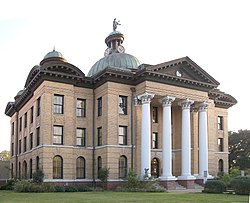Fort Bend County
| Fort Bend County, Texas | ||
|---|---|---|

Richmond's Fort Bend County Courthouse in November 2008
|
||
|
||
 Location in the U.S. state of Texas |
||
 Texas's location in the U.S. |
||
| Founded | 1838 | |
| Named for | A blockhouse positioned in a bend of the Brazos River | |
| Seat | Richmond | |
| Largest city | Sugar Land | |
| Area | ||
| • Total | 885 sq mi (2,292 km2) | |
| • Land | 861 sq mi (2,230 km2) | |
| • Water | 24 sq mi (62 km2), 2.7% | |
| Population | ||
| • (2014) | 652,365 | |
| • Density | 697/sq mi (269/km²) | |
| Congressional districts | 9th, 22nd | |
| Time zone | Central: UTC-6/-5 | |
| Website | www |
|
Fort Bend County is a county in the U.S. state of Texas. As of the 2010 census, its population was 585,375, making it the tenth-most populous county in Texas. Fort Bend County is the wealthiest county in Texas with a median household income of $95,389 and a median family income of $105,944, having surpassed Collin and Rockwall counties (Dallas suburbs) since the 2000 census. The county seat is Richmond, while its largest city is Sugar Land. The county was founded in 1837 and organized the next year. It is named for a blockhouse at a bend of the Brazos River; the fort was the start of the community in early days.
Fort Bend County is included in the Houston–The Woodlands–Sugar Land Metropolitan Statistical Area. It was listed by Forbes as the 5th fastest-growing county in the United States.
Prior to European settlement, the area was inhabited by the Karankawa Indians. Mexican colonists had generally not reached this area, settling more in south Texas.
After Mexico achieved independence from Spain, Anglo-Americans started entering from the east. In 1822, a group of Stephen F. Austin's colonists, headed by William Travis, built a fort at the present site of Richmond. The fort was called "Fort Bend", since it was built in the bend of the Brazos River. The city of Richmond was incorporated under the Republic of Texas along with nineteen other towns in 1837. Fort Bend County was created from parts of Austin, Harris, and Brazoria counties in 1838.
Fort Bend developed a plantation economy based on cotton and, due to the high number of African-American slaves held as laborers, it was one of six majority-black counties in the state by the 1850s. In 1860 the slave population totaled 4,127, more than twice that of the 2,016 whites. There were very few free blacks, as Texas refused them entry.
...
Wikipedia

